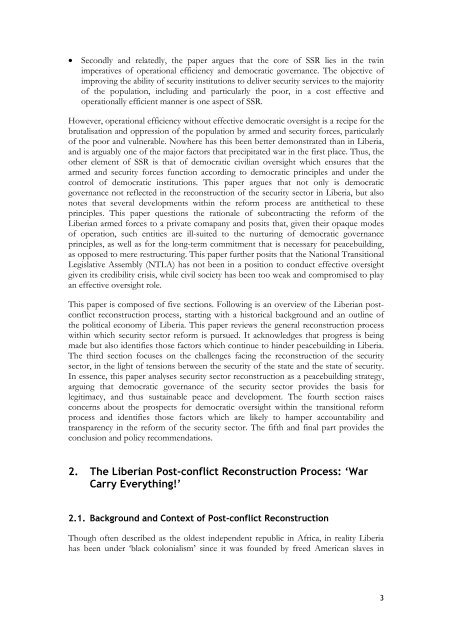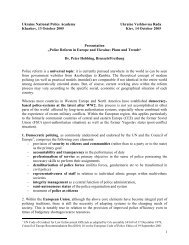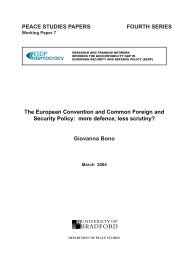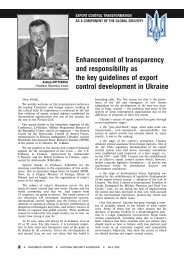The Challenges and Opportunities of Security Sector Reform in Post ...
The Challenges and Opportunities of Security Sector Reform in Post ...
The Challenges and Opportunities of Security Sector Reform in Post ...
You also want an ePaper? Increase the reach of your titles
YUMPU automatically turns print PDFs into web optimized ePapers that Google loves.
• Secondly <strong>and</strong> relatedly, the paper argues that the core <strong>of</strong> SSR lies <strong>in</strong> the tw<strong>in</strong><br />
imperatives <strong>of</strong> operational efficiency <strong>and</strong> democratic governance. <strong>The</strong> objective <strong>of</strong><br />
improv<strong>in</strong>g the ability <strong>of</strong> security <strong>in</strong>stitutions to deliver security services to the majority<br />
<strong>of</strong> the population, <strong>in</strong>clud<strong>in</strong>g <strong>and</strong> particularly the poor, <strong>in</strong> a cost effective <strong>and</strong><br />
operationally efficient manner is one aspect <strong>of</strong> SSR.<br />
However, operational efficiency without effective democratic oversight is a recipe for the<br />
brutalisation <strong>and</strong> oppression <strong>of</strong> the population by armed <strong>and</strong> security forces, particularly<br />
<strong>of</strong> the poor <strong>and</strong> vulnerable. Nowhere has this been better demonstrated than <strong>in</strong> Liberia,<br />
<strong>and</strong> is arguably one <strong>of</strong> the major factors that precipitated war <strong>in</strong> the first place. Thus, the<br />
other element <strong>of</strong> SSR is that <strong>of</strong> democratic civilian oversight which ensures that the<br />
armed <strong>and</strong> security forces function accord<strong>in</strong>g to democratic pr<strong>in</strong>ciples <strong>and</strong> under the<br />
control <strong>of</strong> democratic <strong>in</strong>stitutions. This paper argues that not only is democratic<br />
governance not reflected <strong>in</strong> the reconstruction <strong>of</strong> the security sector <strong>in</strong> Liberia, but also<br />
notes that several developments with<strong>in</strong> the reform process are antithetical to these<br />
pr<strong>in</strong>ciples. This paper questions the rationale <strong>of</strong> subcontract<strong>in</strong>g the reform <strong>of</strong> the<br />
Liberian armed forces to a private comapany <strong>and</strong> posits that, given their opaque modes<br />
<strong>of</strong> operation, such entities are ill-suited to the nurtur<strong>in</strong>g <strong>of</strong> democratic governance<br />
pr<strong>in</strong>ciples, as well as for the long-term commitment that is necessary for peacebuild<strong>in</strong>g,<br />
as opposed to mere restructur<strong>in</strong>g. This paper further posits that the National Transitional<br />
Legislative Assembly (NTLA) has not been <strong>in</strong> a position to conduct effective oversight<br />
given its credibility crisis, while civil society has been too weak <strong>and</strong> compromised to play<br />
an effective oversight role.<br />
This paper is composed <strong>of</strong> five sections. Follow<strong>in</strong>g is an overview <strong>of</strong> the Liberian postconflict<br />
reconstruction process, start<strong>in</strong>g with a historical background <strong>and</strong> an outl<strong>in</strong>e <strong>of</strong><br />
the political economy <strong>of</strong> Liberia. This paper reviews the general reconstruction process<br />
with<strong>in</strong> which security sector reform is pursued. It acknowledges that progress is be<strong>in</strong>g<br />
made but also identifies those factors which cont<strong>in</strong>ue to h<strong>in</strong>der peacebuild<strong>in</strong>g <strong>in</strong> Liberia.<br />
<strong>The</strong> third section focuses on the challenges fac<strong>in</strong>g the reconstruction <strong>of</strong> the security<br />
sector, <strong>in</strong> the light <strong>of</strong> tensions between the security <strong>of</strong> the state <strong>and</strong> the state <strong>of</strong> security.<br />
In essence, this paper analyses security sector reconstruction as a peacebuild<strong>in</strong>g strategy,<br />
argu<strong>in</strong>g that democratic governance <strong>of</strong> the security sector provides the basis for<br />
legitimacy, <strong>and</strong> thus susta<strong>in</strong>able peace <strong>and</strong> development. <strong>The</strong> fourth section raises<br />
concerns about the prospects for democratic oversight with<strong>in</strong> the transitional reform<br />
process <strong>and</strong> identifies those factors which are likely to hamper accountability <strong>and</strong><br />
transparency <strong>in</strong> the reform <strong>of</strong> the security sector. <strong>The</strong> fifth <strong>and</strong> f<strong>in</strong>al part provides the<br />
conclusion <strong>and</strong> policy recommendations.<br />
2. <strong>The</strong> Liberian <strong>Post</strong>-conflict Reconstruction Process: ‘War<br />
Carry Everyth<strong>in</strong>g!’<br />
2.1. Background <strong>and</strong> Context <strong>of</strong> <strong>Post</strong>-conflict Reconstruction<br />
Though <strong>of</strong>ten described as the oldest <strong>in</strong>dependent republic <strong>in</strong> Africa, <strong>in</strong> reality Liberia<br />
has been under ‘black colonialism’ s<strong>in</strong>ce it was founded by freed American slaves <strong>in</strong><br />
3

















